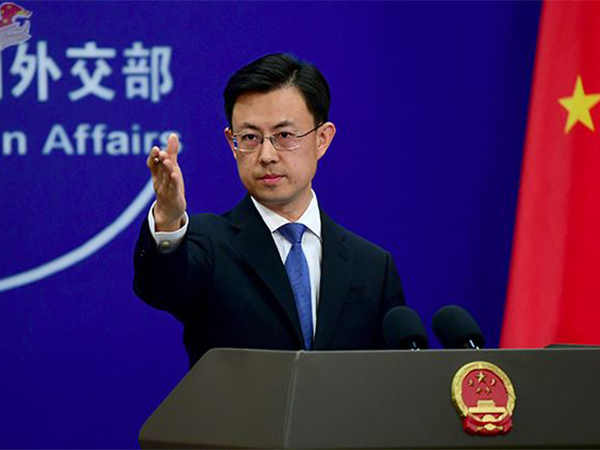Amid distrust, Afghan peace talks in Doha a road to nowhere: PoK activist
Jan 08, 2021

London [UK], January 8 : Amjad Ayub Mirza, an exiled activist from Pakistan-occupied Kashmir raised doubts over the ongoing peace negotiations held in Doha between the Afghan government and Taliban.
Taliban-Afghan peace talks that resumed on January 5, 2021, in the capital of Qatar, Doha have been marked with distrust. In December, the head of Taliban political wing in Doha, Mullah Baradar was officially visiting Pakistan as head of a three-member delegation. He held meetings with Prime Minister Imran Khan and Foreign Minister Shah Mahmood Qureshi in which a strategy was designed to steer the talks in favour of the Taliban and eventually Pakistan, said Mirza.
As per him, both the Taliban delegation and Pakistan allegedly agreed to drag the negotiations till May 2021, the month when American troops would finally leave Afghanistan.
"The Taliban have no desire for peace. They are applying tactics that are aimed at prolonging the peace negotiations until the US troops leave the country," said Afghan chief of intelligence Ahmed Zia Saraj while briefing the Afghan Parliament on January 6.
Moreover, Afghan First Vice President Amrullah Saleh informed a public meeting that the Taliban could not give legitimacy to their violence from a religious perspective. "Well, this sums up the gist of the form of the Doha peace talks. While the Taliban insist on Shariah Law to be enforced in Afghanistan, the democratically elected government of Ashraf Ghani is adamant that only through democratically held elections will the future of Afghanistan be decided. Hence, I foresee a stalemate," he added.
Mirza charged Pakistan of meddling with the internal affairs of Afghanistan for the past six decades. Pakistani establishment holds a grudge against Afghanistan that goes way back to 1949 when it opposed Pakistan's membership to the UN. This grudge was remembered by the former President of Pakistan Pervez Musharraf in a televised interview which still wanders over several social media platforms, said the activist.
Moreover, Pakistan has always envied Indo-Afghan relations and has been treating Afghanistan as a necessary neighbour for its strategic depth against India. Hence, the desire to be able to control the seat of power in Kabul has always been the pivot of South Asian foreign policy of the rogue Islamic jihadist state of Pakistan, added Mirza.
Instead, India has been helping Afghanistan in its reconstruction, despite the fact that Afghanistan is predominantly a Muslim country, said the activist.
Pakistan has been hindering any development project that is initiated by India. For instance, in August 2019 Pakistan refused to grant Afghanistan permission for the transportation of Indian goods through Wagah border. It was the year when Indian exports to war-stricken Afghanistan had almost touched USD one billion. India's exports grew over 89 per cent between 2015-16 and 2019-20. Today Indian export volume is close to USD two billion, he added.
After Pakistan's refusal back in September 2016 to grant his country to engage in direct trade with India, Indian Prime Minister Narendra Modi and Afghan President Ashraf Ghani decided to establish an air corridor bypassing Pakistan. Both countries are also taking advantage of the Iranian port of Chabahar for trade.
India has been involved in serious infrastructure development projects in Afghanistan. The current National Assembly building in Kabul, which was built by India at a cost of USD 90 million, was jointly inaugurated by the head of states of both India and Afghanistan on April 26, 2019. India constructed a 218-kilometre road from Delaram to Zaranj (on the Afghan-Iranian border) that gives Afghanistan an alternate connection with Iran.
In November 2020 India and Afghanistan signed an agreement to construct Shatoot dam that would provide safe drinking water to two million residents of Kabul city. Currently, there are more than 100 projects worth USD 80 million that India is involved in.
Up until 2020, India has reportedly spent over USD three billion to help Afghanistan build capacity and capabilities of Afghan nationals as well as its institutions. Indian External Affairs Minister S Jaishanker while addressing a conference in Geneva said that there was no part of Afghanistan today untouched by his government's 400 plus projects spread across all the 34 provinces of Afghanistan.
"The growing trade partnership between India and Afghanistan is looked upon by Pakistan as a basis for political collaboration between the two nations. It is therefore in the interest of Pakistani military establishment to sabotage any attempt that might end up in her neighbour-joining forces with her arch-rival. It is in this context that I have come to the conclusion that unless Pakistani military establishment is defeated on her home ground and dismantled, the prospect of peace in South Asia will be minimal," said Mirza.
If the Afghan government's purpose of holding peace talks in Doha with global terrorists was to buy time for Ashraf Ghani to strengthen the country's security and military capabilities then that aim has been frustrated by the continuous attacks on security forces and pro-democracy activists, explained Mirza.
Meanwhile, on Wednesday while speaking to a public meeting in Eastern Nangarhar President Ashraf Ghani sent Pakistan a clearer message when he said that he rejects prospect of an interim government.


















